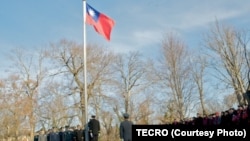The United States has disavowed any advance knowledge of a controversial New Year’s Day ceremony involving the raising of the Taiwan flag over the residence of the Taiwan representative to Washington.
China’s Foreign Ministry denounced the ceremony and urged the United States to prevent similar events from happening again.
U.S. State Department spokeswoman Jen Psaki said Monday the U.S. government was unaware of the event involving a flag-raising ceremony at the Twin Oaks estate in Washington that serves as the principle resident office of Taiwan in the United States.
"We did not know about the January 1 flag-raising at Twin Oaks in advance. The ceremony is not consistent with U.S. policy. We remain fully committed to the U.S. one-China policy based on the three communiqués and the Taiwan Relations Act [of 1979]," Psaki said. "No U.S. government personnel attended the event in any capacity."
China reaction
Earlier Monday, China denounced the ceremony.
Foreign Ministry spokeswoman Hua Chunying said China was firmly opposed and lodged “solemn representations with the U.S.” Hua urged Washington to abide by the one-China policy and said the Taiwan matter should be handled “cautiously and properly.”
VOA's Mandarin service reported the flag was raised New Year’s Day for the first time in 36 years since the signing of the 1979 U.S./China Joint Communique. That document switched U.S. diplomatic recognition from Taipei to Beijing, recognizing the People’s Republic of China as the sole legal government of China, and acknowledging that Taiwan is part of China.
The report said the flag was raised during a ceremony at the Taipei Economic and Cultural Representative Office (TECRO) attended by more than 100 people, including Taiwan’s top envoy, Shen Lyu-shun, who said the ceremony was made possible by the U.S. government.
The Taipei Times described the flag-raising as a symbol of significant progress in Taiwan-U.S. relations. It said the U.S. government was notified in advance and gave its approval, provided the ceremony remained low-profile and was not televised.
Expert sees overreaction
Asian Studies professor and Taiwan expert William Sharp of Hawaii-Pacific University said mainland China is overreacting to the incident.
"China is overly sensitive about this type of issue. Any issue that touches on sovereignty, China tends to overreact, in my view," Sharp said.
"Essentially, what they’re doing is they’re giving Taiwan more press exposure than it otherwise gets. I mean, for the most part, the U.S. press, more or less, overlooks Taiwan. It’s overclouded by China. This is just giving Taiwan more visibility, which it seems China doesn’t really want," he said.
Sharp said a flag-raising ceremony at the Twin Oaks estate is not like raising it at a diplomatic facility, but rather at a private residence.
He also said U.S.-Taiwan relations have improved under Taiwan President Ma Ying-jeou, in part because it has lowered tensions with China along the 180-kilometer-wide Taiwan Strait.
Also, in November, U.S. State Department official Kurt Tong visited the island to discuss trade and investment matters. And in December, U.S. President Barack Obama approved the sale of four Perry-class guided-missile frigates to Taiwan, drawing a sharp rebuke from China.
Sharp said China may also be concerned Taiwan is pulling away from the mainland rather than moving closer, despite deepening economic ties.
"You know, there was the Sunflower movement that took place last March and I think Beijing sees that as a hardening of Taiwan attitudes, that there’s a growing sense of Taiwan identity. They understand that people there might not be as anxious to unite with the mainland as Beijing would hope they would be," Sharp said.
Sunflower movement
During the Sunflower movement, students and civic groups briefly occupied the Taiwan legislature in protest of the signing of the Cross-Strait Service Trade Agreement (CSSTA), which they believed would make Taiwan vulnerable to political pressure from Beijing.
President Ma’s ruling Kuomintang party suffered heavy losses in November’s local elections, forcing him to step down as party chairman.
Some analysts said his policy of closer ties with China contributed to his party’s electoral defeat.













